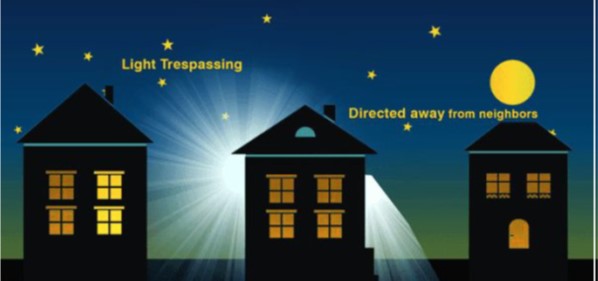
By CHERYL ROMANO/YachatsNews.com
Does your neighbor’s security light shine in your bedroom window? Is your own motion sensor light so bright it actually hides a night-time trespasser?
Lighting issues like these will be up for discussion Tuesday, Oct. 20 when the Yachats Planning Commission opens a “virtual” public hearing on a proposed new lighting ordinance.
In the talking and studying stage for more than a year, the ordinance focuses on regulating outdoor lighting to achieve four goals:
- Promote “health, safety, security, and productivity.”
- Protect shoreline natural resources and wildlife.
- Enhance views of the “dark sky.”
- Minimize the negative effects of bright outdoor lighting.
An initial idea to possibly eliminate or put a curfew on marine lights like those used at the Adobe Resort and Overleaf Lodge to illuminate the shoreline was dropped because such restrictions – although rarely enforced – are already contained in Yachats municipal code making it illegal to direct lights onto parks and other public properties.
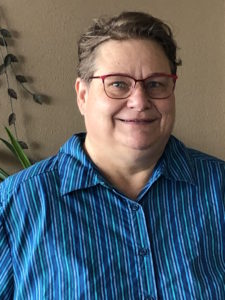
“If we regulate marine lighting, we implicitly make it legal,” said commission chair Helen Anderson. “We thought it better to keep restrictions on anything new.”
All new construction would be covered under the ordinance — if it is passed by the City Council, which would hold its own public hearing.
Existing structures, both residential and commercial, would also have to comply with the regulations – but requires a complaint to the city and a finding of a violation by the enforcement officer.
Downlights and uplighting
Among other things, the proposed ordinance would mandate these rules:
- Outdoor lighting fixtures and accent lights must be shielded and aimed down.
- All “trespass lighting” (like the neighbor’s light that shines into your bedroom) must meet certain brightness restrictions, and not spread beyond the source’s property line.
- Motion-activated security lights can’t be triggered by motion on adjacent properties or streets.
- “Uplighting” of building and landscaping is prohibited.
- No lights on buildings may be placed above the eaves.
Also proposed are limits on individual lights so that the total light output doesn’t exceed a range of “lumens,” depending on lot size.
One incandescent 60-watt bulb equals 800 lumens. For example, on residential lots less than 0.3 acres, the limit on total light output would be 3,200 lumens — four 60-watt bulbs.
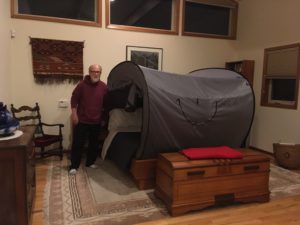
There is no hard-and-fast limit on the number of exterior lights a building can have; all the ordinance would restrict is the total light output.
There are additional limits proposed for single-family residential, multi-family and commercial uses.
The full ordinance, which is a draft and not final, is posted on the city’s website. The Planning Commission’s public hearing is scheduled for 2 p.m. Tuesday, Oct. 20. People who want to attend via Zoom online can connect through a link that will be posted on the city website.
Comments can also be submitted to city planner Holly Hamilton in advance of the hearing via email to Planner@yachatsmail.org
“We can accept email as testimony in the hearing,” said Anderson, adding that letters can also be submitted, also to Hamilton, by mail to City of Yachats, P.O. Box 345, Yachats, OR 97498.
In drafting the ordinance, the Planning Commission started with a model code from the League of Oregon Cities and also drew from the International Dark-Sky Association, the recognized authority on light pollution.
Dark-Sky defines light pollution as “Any adverse effect or impact attributable to artificial light at night.” According to the Dark-Sky website, research indicates that this pollution can harm human health, wildlife and eco-systems, and encourage energy waste. In addition, there is “no clear scientific evidence that increased outdoor lighting deters crimes,” Dark-Sky states.
“Brighter is not safer”
Last year, some residents complained to the city about excessive or intrusive lighting on buildings in Yachats. That’s when the City Council turned the issue over to the Planning Commission for study, which has been spearheaded by vice chair Lance Bloch. “Trespass lighting was the single biggest issue people wanted to talk about,” Bloch said.
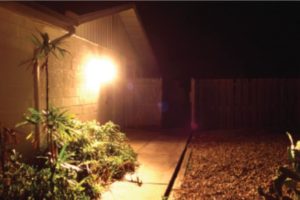
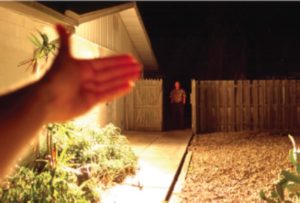
The discontent wasn’t limited to security lights alone, he reported, but also applied to lights on timers that burned all night long in some cases, and very bright outdoor lighting. This was especially true of some homes not occupied full-time, such as second homes and vacation rentals.
“The owners felt the lights were important to keep houses from being burglarized,” Bloch said.
Ironically, Anderson said, one of the commission’s big findings was that “brighter is not safer.”
“Really bright light can cause glare, and actually block out objects or people,” she said. “It’s like driving toward a car with its brights on — you’re blinded.”
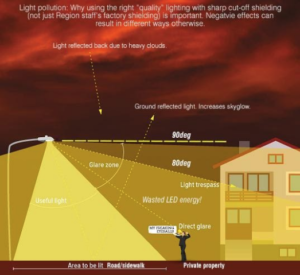
The most important issue addressed by the ordinance, said Bloch, is “to restrict lighting that shines on areas outside of a person’s private property.”
Uplighting on landscaping generally shines “not just up but is also visible from neighboring properties,” he said. “Anytime you have uplighting you have trespass lighting. We needed to implement shielding on residential and commercial lighting” to prevent excess light from shining outside a particular property.
“This isn’t a Dark-Sky ordinance, but we’re using pieces where we can,” explained Anderson. “It’s a really good start to moving Yachats in the direction of Dark-Sky; a lot of local people would like that.”
She noted that current city code doesn’t provide any way to enforce problems with lighting.
“Anything that came up in the past was up to the good will of the residents, or the businesses, to resolve. With this ordinance, the city can say, ‘You’re in violation.’”
When and if the ordinance is enacted by the Council, complaints — about either new or existing homes and businesses — would be handled under the city’s code enforcement process.
Bloch estimated that if the lighting ordinance moves forward, it would take at least two to four months to be enacted.



We are full time residents of Yachats, living on Ocean View Drive. There are vacation rentals on both sides of us. We are in favor of the proposed Yachats outdoor lighting ordinance. We routinely have to deal with super bright lights lighting up our house many nights. It occurs many times with no tenancy. I have talked to Sweet Homes Rentals many times to install a motion detection light, to deaf ears. There is both a bright light on the side of one house, another one on the porch, and another one in the kitchen that makes the side one even worse. Ideally, we would like to see motion lights powered by solar. Finally, at least, Sweet Homes installed a switch to turn off the porch light; before, it was on 24 hours a day. I pleaded with them to do a proper repair, to no avail. That is just one house. There are unmonitored porch lights on two houses on the other side of our house. It has been worse this season for some reason. Maybe a sticker on the door reminding guests to turn off the lights would help. Motion detection lights are a $20 repair. We are not asking for much. We see little reason to have all of these porch lights on nightly. It impacts the star gazing, one of our best things to do.